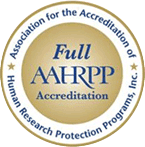ClinicalTrials.gov Quarterly Newsletter
The University of Iowa ClinicalTrials.gov Working Group
A Note From the ClinicalTrials.gov PRS Administrator, Brian Brotzman
Benefits of ClinicalTrials.gov Registration

When asked why they register a study on ClinicalTrials.gov, many investigators say ‘because I have to.’ This may be unsurprising, as there many requirements such as the law, because the funder of the study requires it, or in order to publish in certain journals. Last issue, I spoke on the positive reasons of why a public record of clinical trial information was both good and needed in research. If you read that article, you can already identify some benefits of having a site like ClinicalTrials.gov, but are there any direct benefits to the investigator?
In short, yes. There are direct benefits of publishing on ClinicalTrials.gov, as well as potential future benefits to investigators. Firstly, because ClinicalTrials.gov is a well-known public site, it is an excellent recruitment tool. Potential participants from across the nation, and even in other countries, use ClinicalTrials.gov to see what research is available and to find potential clinical trials related to a specific disease. Additionally, ClinicalTrials.gov is a great platform to share your research efforts with others. Many people use this site including journal editors, funding parties and sponsors, and even other researchers. This allows your research to get attention from like-minded individuals interested in your area of study. This also grants you as a researcher the ability to see what research in your area has been, or is being, conducted. Investigators can also use their record to link to their publications, or other studies, making this an invaluable platform of information. An added benefit of this wealth of information is the ability to identify future funding opportunities by seeing what research exists, and how funders such as NIH have been sponsoring research.
Finally, ClinicalTrials.gov offers an unprecedented wealth of clinical trial data that reported in a standardized format, meaning all the data on the site is readily comparable. The potential for this data has yet to be fully explored but seems to have incredible possibilities. For more information on using data from ClinicalTrials.gov, see their webpage on downloading content for analysis. Can you think of other ways ClinicalTrials.gov can benefit you? Taking a bit of time to explore ClinicalTrials.gov may surprise you.
Getting Started with ClinicalTrials.gov
By: Angela Childs and Kim Sprenger

Do you need to register a study on ClinicalTrials.gov? If your study involves the use of a drug, device, or behavioral intervention or you want to publish your research in an academic journal, it is a question you should consider. Whether required to do so, or for another reason, knowing where to start can be a challenge. However, this process can be made easier by working with a ClinicalTrials.gov Working Group member. To get started, the ClinicalTrials.gov Working Group has developed the Getting Started Checklist for ClinicalTrials.gov. This resource is the best place to start to prepare for registration and results reporting at ClinicalTrials.gov.
The University of Iowa (UI) Institutional Review Board (IRB) helps investigators determine when ClinicalTrials.gov requirements apply, to assure compliancy with any related regulation or policy. Therefore, it is recommended to first submit a study to the IRB, if you are unsure about the registration and results reporting requirements. If you are unable to wait for the IRB, the ClinicalTrials.gov Working Group can assist the PI in evaluating these determinations before a study is sent to the IRB by completing the HawkACT Determination Form. Once a determination is made, the IRB reviewers and Protocol Registration and Results System (PRS) administrator will assist in assuring the record is updated appropriately. The NCT number must be entered in VII.B.1.b of the IRB application prior to IRB approval to show that the ClinicalTrials.gov record has been created. This will also help the IRB to know your ClinicalTrials.gov record exists and needs review along with IRB modifications or Continuing Reviews. Likewise, the ClinicalTrials.gov record must list the IRB number as the ‘Unique Protocol ID’ so that the records can be linked.
Investigators seeking to publish on ClinicalTrials.gov should contact ct.gov@uiowa.edu to have an account created for them. Once registered in the system, users will be able to add new projects and update existing ones in the PRS at any time. The UI stores and maintains its own records for ClinicalTrials.gov but the review and publication of these records to ClinicalTrials.gov happens outside the institution by the PRS.
The ClinicalTrials.gov Working Group has developed additional tools for study teams to use which are available on the UI Human Subjects Office (HSO) ClinicalTrials.gov web-page.
For questions and assistance with ClinicalTrials.gov, please complete this Help Request Form, or email the PRS administrator at ct-gov@uiowa.edu.
Common Mistakes in ClinicalTrials.gov Records
By: Brian Brotzman

A recent presentation from the National ClinicalTrials.gov Taskforce examined the most common problems found in review of ClinicalTrials.gov Protocol Registration and Results System (PRS). According to the PRS presenters, the most common issue lies in poorly constructed Outcome Measures. The Outcome Measure is a description of the specific outcomes the clinical trial is attempting to ascertain. Each measure should be clearly defined, provide enough detail to understand clearly what is being evaluated and how, be written so that a non-medically trained person can understand it, and represent something which is directly measurable. See our article on Writing Outcome Measures in this newsletter.
The second most common mistake made in records, according to PRS reviewers, was that reviewer comments were not always satisfactorily addressed, or not addressed at all. This finding was a bit more surprising, considering that these comments can seemingly be addressed by taking the time to review the record before resubmission. However, there may be more to this finding than a lack of review. Reviewer comments are written to be general and are informed by the ‘Definitions’ and ‘Help’ criteria found in each PRS module. In other words, comments are based on the expectations of the system (such as completing an outcome measure appropriately), but rarely give explicit detail on what needs to be changed. In addition, there is no easy mechanism for direct feedback from the reviewers, so investigators may not fully understand what information the reviewers are asking to have updated.
There may be improvements to make regarding this concern on both ends. It is important to remember that each record should be reviewed by the Responsible Party prior to release, as this can save a lot of time and effort by avoiding the need to respond to reviewer comments. If investigators ever do have questions on a comment, they can contact the PRS reviewers via email for feedback and have the option to set up a call to discuss the record. Each time the record has issues, it must again be released by the Responsible Party and reviewed by the PRS team. This process slows down the approval process and can typically be avoided by a review of the record prior to submission. A final note investigators should keep in mind is that the PRS review does not require a perfect submission. Rather, only that it be ‘publishable’, meaning the content is clear and consistent throughout. It is still the responsibility of the Responsible Party and Record Owner to make sure what is being submitted is free of error.
The University of Iowa Compliance and Education Program has conducted a review of all the comments PRS reviewers have entered into the institution’s records. Results show that, on average, about 70% of submissions are returned with issues to addressed. Of this 70%, most issues are resolved in the first round of review. The most common mistakes noted were as follows:
- Errors in writing the Outcome Measure: 220
- Errors in reporting time frame of an Outcome Measure: 192
- Errors in reporting consistent numbers or units of measure: 134
- Errors in spelling, grammar, or the use of acronyms and abbreviations: 128
- Errors in specifying the arms and interventions: 105
In addition, a few other areas were identified as problems which applied only to a few cases:
- Insufficient information on the assessment tools used for the Outcome Measure
- Missing data from the record
- Conclusions from the data drawn, rather than reporting summary information
- Statistical concerns
- Other, non-major issues
Posting of the Informed Consent Document for Federally-Funded Clinical Trials
By: Brian Brotzman


The Common Rule, 45 CFR 46, was updated on January 29, 2019 for the first time in over three decades. The update means many changes for the standards of IRB review, as well as updates to the expectations of human subjects researchers. In particular, clinical trial researchers have new obligations to disclose certain information in the informed consent document, and an expectation to upload this document to a public site if any type of federal funding is utilized to support the clinical trial.
The public websites which may be used to complete this expectation are ClinicalTrials.gov and Regulations.gov (under docket ID HHS-OPHS-2018-0021). At the University of Iowa, ClinicalTrials.gov should be used as the platform on which the consent is posted, unless the clinical trial was not required to register on ClinicalTrials.gov.
The informed consent document which you post must have been approved by an IRB and used to enroll subjects. Any version of the informed consent document can be uploaded to satisfy this requirement, as long as the previous criteria are met. University of Iowa researchers are encouraged to upload their final consent document, but this is not required. However, there are only 60 days from the time the study meets its completion date (the date the final subject was enrolled and completed study procedures to answer your research questions) to assure you are in compliance with this expectation. To help remind investigators of this expectation, VII.B.1.c has been added to the Hawkirb application which asks investigators to enter their anticipated study completion date. While this date may be changed, investigators should make an effort to list an accurate date in this section. This question will only be displayed if your study is a clinical trial and has federal funding indicated in the IRB application.
Drafting an Outcome Measure
By Patrick Ten Eyck and Deb O’Connell-Moore

When developing a research project, it is crucial for investigators to carefully craft a goal, which can in turn lead to determining appropriate outcomes to measure that goal. However, these concepts are often confused with each other and can lead to ineffectively articulated study aims and improperly conducted analytic procedures. This article aims to provide a clear distinction between these concepts and guide investigators on writing study outcomes. Study outcomes are required in a ClincialTrials.gov submission and seem to be one of the most difficult components to complete.
To begin, Goals are general, broad, and are often abstract statements of desired results that are determined at the conception of the study. Outcomes, on the other hand, are more specific, narrow, and measurable quantities that reflect the goals in a concrete fashion.
When entering an Outcome Measure in the ClinicalTrials.gov record, there are three components that need to be entered; title, description and time frame. As identified above, the ClinicalTrials.gov outcome measure(s) should address the intervention(s) outcome specifically, not the overall goal.
Let’s look at an example: Suppose we wish to evaluate a new stress reduction program for patients who experience anxiety. The overall goal of the study would be to assess if the stress reduction program decreases anxiety in patients. To address this in terms of an outcome, we identify measures that quantify the goal. This study will use a questionnaire to assess anxiety in daily living at the baseline and 6-month visits and daily diary of medications used such as valium. One of the outcome measures may be:
Title: Decrease in Anxiety
Description: Anxiety in Daily Living Questionnaire will be administered to measure patient reported anxiety in daily living.
Time Frame: Baseline and 6-month visits.
As you can see, this outcome is measurable and reportable. When writing your outcome measures, it is important to think about how you will be reporting your study’s results in ClinicalTrials.gov. Sometimes it is helpful to work backwards and think about reporting your results of the study and then formulating your outcome measures based on how or what you will be reporting.
Trial Tips to Tout
- NEW! The HawkACT Determination Form is now available. Investigators can utilize this form to receive an ACT determination informally (for funding purposes), or to communicate information to the IRB in their consideration of the ACT determination.
- Need Help? Request a meeting with a ClinicalTrials.gov Departmental Liaison by completing this help request form.
- The ‘Unique Protocol ID’ field in the ClinicalTrials.gov Protocol Registration and Results System (PRS) record should list the HawkIRB number- digits only - (e.g. 123456789). This is institutional policy, and will not appear as an error in the PRS.
- UI investigators who initiate a protocol are considered 'Sponsor-investigators'
- 'Principal Investigator' is a designation indicating when an outside sponsor delegates responsibility to a PI.
- Keep in mind that ‘Principal Investigator’ and ‘Sponsor’ are almost never appropriate designations for your records, and are used only in special circumstances.
- The University of Iowa should never be listed as the sponsor of a study unless you are notified to do so by a PRS administrator.
- It is very important to keep your record up to date and to avoid being put on the problem list.
- ACTs on the problem list are in non-compliance with federal regulations and are subject to civil and criminal penalties.
- PRS offers help and advice via the ‘Help’ and ‘Definitions’ links for each section of the record.
- The Human Subjects Office ClinicalTrials.gov page is a great resource
- The PRS Administrator is available to offer assistance by emailing ct-gov@uiowa.edu, or by calling 319-384-4623.


